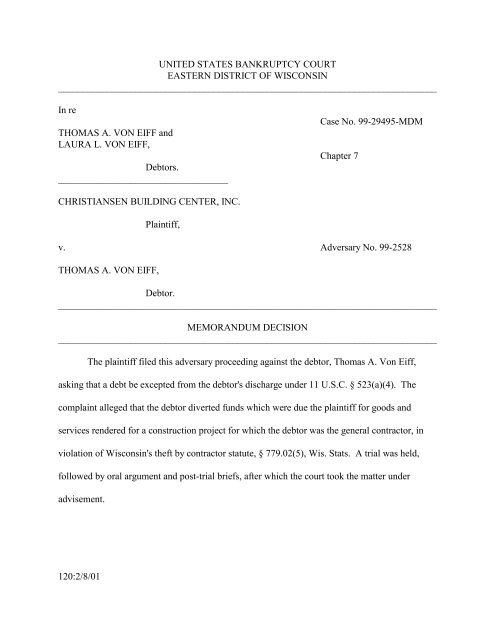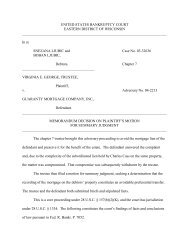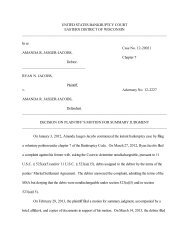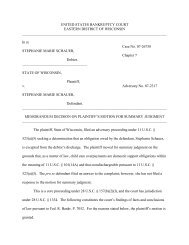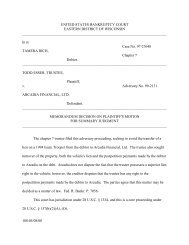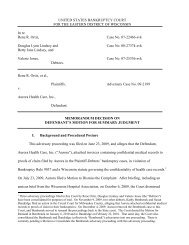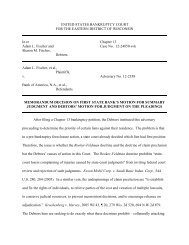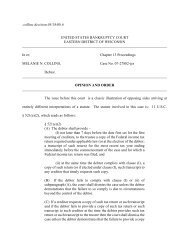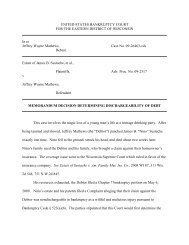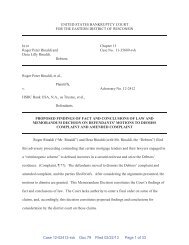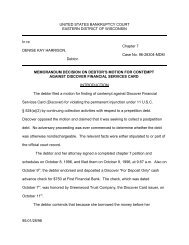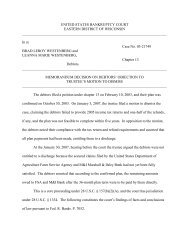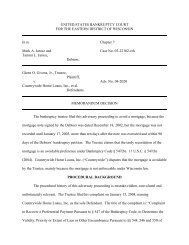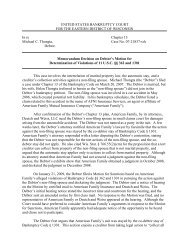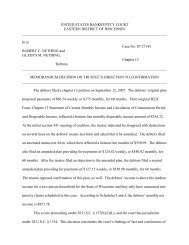In re Thomas & Laura Von Eiff, Case No. 99-29495, Christiansen ...
In re Thomas & Laura Von Eiff, Case No. 99-29495, Christiansen ...
In re Thomas & Laura Von Eiff, Case No. 99-29495, Christiansen ...
You also want an ePaper? Increase the reach of your titles
YUMPU automatically turns print PDFs into web optimized ePapers that Google loves.
UNITED STATES BANKRUPTCY COURT<br />
EASTERN DISTRICT OF WISCONSIN<br />
______________________________________________________________________________<br />
<strong>In</strong> <strong>re</strong><br />
THOMAS A. VON EIFF and<br />
LAURA L. VON EIFF,<br />
Debtors.<br />
___________________________________<br />
<strong>Case</strong> <strong>No</strong>. <strong>99</strong>-<strong>29495</strong>-MDM<br />
Chapter 7<br />
CHRISTIANSEN BUILDING CENTER, INC.<br />
Plaintiff,<br />
v. Adversary <strong>No</strong>. <strong>99</strong>-2528<br />
THOMAS A. VON EIFF,<br />
Debtor.<br />
______________________________________________________________________________<br />
MEMORANDUM DECISION<br />
______________________________________________________________________________<br />
The plaintiff filed this adversary proceeding against the debtor, <strong>Thomas</strong> A. <strong>Von</strong> <strong>Eiff</strong>,<br />
asking that a debt be excepted from the debtor's discharge under 11 U.S.C. § 523(a)(4). The<br />
complaint alleged that the debtor diverted funds which we<strong>re</strong> due the plaintiff for goods and<br />
services <strong>re</strong>nde<strong>re</strong>d for a construction project for which the debtor was the general contractor, in<br />
violation of Wisconsin's theft by contractor statute, § 779.02(5), Wis. Stats. A trial was held,<br />
followed by oral argument and post-trial briefs, after which the court took the matter under<br />
advisement.<br />
120:2/8/01
This court has jurisdiction under 28 U.S.C. § 1334(b), and this is a co<strong>re</strong> proceeding under<br />
28 U.S.C. § 157(b)(2)(I). The following opinion constitutes the court's findings of fact and<br />
conclusions of law pursuant to Fed. R. Bankr. P. 7052.<br />
BACKGROUND<br />
G<strong>re</strong>g and Roxanne Platz contracted with <strong>Von</strong> <strong>Eiff</strong> Construction in February 1<strong>99</strong>8 to<br />
perform substantial <strong>re</strong>modeling of their home. The ag<strong>re</strong>ed price for the job was $56,000, and<br />
after the Platzes made a down payment of $26,500, the work commenced. With change orders<br />
ag<strong>re</strong>ed to while construction was underway, the total contract price rose to $67,475. Additional<br />
payments of $20,000 and $2,550 we<strong>re</strong> made in April and June, <strong>re</strong>spectively. During the<br />
construction, the Platzes and Mr. <strong>Von</strong> <strong>Eiff</strong> experienced problems and, ultimately, the work was<br />
never completed by <strong>Von</strong> <strong>Eiff</strong> Construction. <strong>In</strong> fact, of the $67,475 total due from the Platzes to<br />
<strong>Von</strong> <strong>Eiff</strong> Construction, the homeowners paid a total of only $49,050 to Mr. <strong>Von</strong> <strong>Eiff</strong>.<br />
<strong>Christiansen</strong> Building Center (“<strong>Christiansen</strong>”) was the supplier of materials used on the<br />
Platz <strong>re</strong>modeling job (and may have installed doors), including gutters, windows, doors, pine<br />
boards, log railings, and dumpsters. All charges incur<strong>re</strong>d by the debtor with <strong>Christiansen</strong> we<strong>re</strong><br />
allocated to the Platz contract. Other than one payment of $3,828.03 in May 1<strong>99</strong>8 and various<br />
other c<strong>re</strong>dits totaling $215.73, <strong>Von</strong> <strong>Eiff</strong> Construction never paid the <strong>re</strong>maining $18,492.86<br />
balance owed <strong>Christiansen</strong> at the time of filing.<br />
ARGUMENTS<br />
The debtor argues that the majority of monies he <strong>re</strong>ceived from the Platzes only cove<strong>re</strong>d<br />
phase one of the <strong>re</strong>modeling job, which entailed the support for the existing structu<strong>re</strong>, <strong>re</strong>moval of<br />
the foundation, and e<strong>re</strong>ction of a new foundation and basement. Little or no supplies furnished<br />
120:2/8/01 2
y <strong>Christiansen</strong> we<strong>re</strong> used for this portion of the contract, and <strong>Christiansen</strong> should not be allowed<br />
to collect from the initial down payment. Funds <strong>re</strong>ceived for the second phase of the job, which<br />
included the use of the materials supplied by <strong>Christiansen</strong>, we<strong>re</strong> used to pay for other legitimate<br />
construction expenses. The debtor argues that all expenditu<strong>re</strong>s made in connection with this job<br />
we<strong>re</strong> legitimate, and he should not be penalized in his bankruptcy case for being inju<strong>re</strong>d and<br />
having to hi<strong>re</strong> extra help, which <strong>re</strong>sulted in cost overruns. Finally, he argues that <strong>Christiansen</strong><br />
was a me<strong>re</strong> supplier, not a subcontractor who was involved in construction, and it is not entitled<br />
to have its sha<strong>re</strong> of the costs conside<strong>re</strong>d trust funds.<br />
The plaintiff contends that all money <strong>re</strong>ceived by the debtor from the homeowners was<br />
trust money in the hands of the debtor, and subject to the pro rata claims of all suppliers and<br />
subcontractors, which the court calculates to be $12,553.84. 1<br />
DISCUSSION<br />
Section 523(a)(4) of the Bankruptcy Code provides that a debtor does not <strong>re</strong>ceive a<br />
discharge of any debt incur<strong>re</strong>d by way of "defalcation while acting in a fiduciary capacity." State<br />
law determines whether a fiduciary <strong>re</strong>lationship exists. See, e.g., Matter of <strong>Thomas</strong>, 729 F.2d<br />
th<br />
502 (7 Cir. 1984). Section 779.02(5), Wis. Stats., c<strong>re</strong>ates a trust fund in the hands of a prime<br />
contractor or subcontractor for funds <strong>re</strong>ceived from an owner for payment of improvements. The<br />
statute provides in pertinent part as follows:<br />
1<br />
Mr. <strong>Von</strong> <strong>Eiff</strong> <strong>re</strong>ceived $49,050, or 72.69%, of the $67,475 billed the Platzes. Likewise,<br />
<strong>Christiansen</strong> seeks 72.69% of its total claim. Attorney Moczydlowski calculated this as<br />
$12,350.05 in his brief, but he subtracted the debtor's payment from the $18,492.86, the amount<br />
due at filing, befo<strong>re</strong> applying the percentage. Payments and c<strong>re</strong>dits we<strong>re</strong> al<strong>re</strong>ady taken into<br />
account on the plaintiff's statement (Ex. #6); also, payments would have to be added back in<br />
befo<strong>re</strong> applying the percentage. The court calculated damages as described below.<br />
120:2/8/01 3
[A]ll monies paid to any prime contractor or subcontractor by any owner for<br />
improvements, constitute a trust fund only in the hands of the prime contractor or<br />
subcontractor to the amount of all claims due or to become due or owing from the prime<br />
contractor or subcontractor for labor and materials used for the improvements, until all<br />
the claims have been paid, and shall not be a trust fund in the hands of any other person.<br />
The use of any such monies by any prime contractor or subcontractor for any other<br />
purpose until all claims, except those which a<strong>re</strong> the subject of a bona fide dispute and<br />
then only to the extent of the amount actually in dispute, have been paid in full or<br />
proportionally in cases of a deficiency, is theft by the prime contractor or subcontractor of<br />
monies so misappropriated and is punishable under s. 943.20.<br />
Section 779.02(5), Wis. Stats. The statute <strong>re</strong>sults in a cor<strong>re</strong>sponding civil action for parties<br />
damaged by its violation. See, e.g., <strong>Thomas</strong>, 729 F.2d 502; Capen Wholesale, <strong>In</strong>c. v. Probst, 180<br />
Wis. 2d 354, 509 N.W.2d 120 (Ct. App. 1<strong>99</strong>3).<br />
This court is satisfied that a fiduciary <strong>re</strong>lationship existed between the prime contractor,<br />
Mr. <strong>Von</strong> <strong>Eiff</strong>, and the material supplier, <strong>Christiansen</strong>, by virtue of § 779.02(5), Wis. Stats.<br />
Whether the supplier of materials took part in the actual construction (which it may have - the<br />
<strong>re</strong>cord is not clear) or me<strong>re</strong>ly delive<strong>re</strong>d materials to the site, an entity who adds value to <strong>re</strong>al<br />
estate that is paid for by the owner is an intended beneficiary of the statute. The statute protects<br />
suppliers of both labor and materials provided to the owner by a prime contractor, as <strong>Von</strong> <strong>Eiff</strong><br />
was he<strong>re</strong>, or by a subcontractor, and the debtor’s interp<strong>re</strong>tation splits a hair that is not<br />
grammatically supported by the <strong>re</strong>asonable interp<strong>re</strong>tation of the words or meaning of the statute.<br />
Mr. <strong>Von</strong> <strong>Eiff</strong> made cash payments to labo<strong>re</strong>rs on the job, but he claims that he could not<br />
pay his material supplier because he had insufficient funds for the project. He was, however,<br />
able to make other "company" payments to parties other than material suppliers or subcontractors<br />
during that same time period. Checks drawn on <strong>Von</strong> <strong>Eiff</strong> Construction Company's account<br />
during the <strong>re</strong>levant period (April through July 1<strong>99</strong>8) included the following: Tim's Auto Parts,<br />
120:2/8/01 4
$35.72; Federal Kemper <strong>In</strong>surance Co., $347.50; Wisconsin Electric Co., $649.56; Lake States<br />
<strong>In</strong>surance Co., $453; PrimeCo., $705.93 (checks of $255.93, $450); City of Oconomowoc<br />
Utilities, $153.98; Cash (at Herr's Mobil) $50; Rookie's Sports Bar and Grill, $90; Cash<br />
(endorsed by Mr. <strong>Von</strong> <strong>Eiff</strong>), $2,147.09 (various checks); Supersaver, $153 (th<strong>re</strong>e checks of $51);<br />
Oconomowoc Auto Parts, $46.10; Municipal Court, $73.90; Tim's Auto Parts, $89.30; Amoco,<br />
$126.64 (checks of $48.98, $37.41, $40.25); Registration Fee Trust, $74.78; Wisconsin State<br />
Fair, $132; Sam's Club, $110.53; and Erv's Repair Service, $1,168.74. Some of these a<strong>re</strong> clearly<br />
not legitimate charges against the Platz contract, and others a<strong>re</strong> questionable. Since the prime<br />
contractor is not entitled to take a profit or to pay personal expenses from trust funds, or to pay<br />
for other labor and supplies from funds rightfully due <strong>Christiansen</strong>, the propriety of these<br />
expenses is of no assistance to the debtor in determining what should be discharged or excepted<br />
from discharge.<br />
The actual cost of work done by the debtor is not in the <strong>re</strong>cord. It is possible that the<br />
materials supplied by <strong>Christiansen</strong> we<strong>re</strong> a smaller percentage of the debtor’s total cost on the<br />
project than the percentage of the contract price <strong>re</strong>ceived by the debtor. However, it would not<br />
be fair to <strong>re</strong>duce <strong>Christiansen</strong>’s sha<strong>re</strong> of monies <strong>re</strong>ceived by the debtor on account of problems<br />
that had nothing to do with <strong>Christiansen</strong>. <strong>In</strong> any event, liabilities of the debtor in excess of trust<br />
funds due the suppliers of labor and materials a<strong>re</strong> discharged. The<strong>re</strong>fo<strong>re</strong>, the debtor’s total cost is<br />
not a proper measu<strong>re</strong> of damages.<br />
The plaintiff has proven that funds for the improvements passed from the owners to the<br />
prime contractor and did not <strong>re</strong>ach the plaintiff. See W.H. Major & Sons, <strong>In</strong>c. v. Krueger, 124<br />
Wis. 2d 284, 369 N.W.2d 400 (Ct. App. 1985). Although Mr. <strong>Von</strong> <strong>Eiff</strong> asserts that he could not<br />
120:2/8/01 5
pay due to the alleged homeowners' b<strong>re</strong>ach of contract, the<strong>re</strong> was no bona fide dispute as to the<br />
amount due <strong>Christiansen</strong>. See, e.g., Loehrke v. Wanta Builders, <strong>In</strong>c., 151 Wis. 2d 695, 445<br />
N.W.2d 717 (Ct. App. 1989). <strong>In</strong> fact, <strong>Christiansen</strong> has al<strong>re</strong>ady ag<strong>re</strong>ed to <strong>re</strong>duce the total amount<br />
it is owed in <strong>re</strong>lation to the amount of the original contract that <strong>Von</strong> <strong>Eiff</strong> Construction has<br />
<strong>re</strong>ceived.<br />
While the debtor would like to attribute the funds he <strong>re</strong>ceived to costs other than<br />
<strong>Christiansen</strong>, the evidence does not support the allocation of payments or costs to diffe<strong>re</strong>nt<br />
phases of the construction. The contract itself does not do so, nor is the<strong>re</strong> any indication that any<br />
payment was for other than the enti<strong>re</strong> job. Charges by <strong>Christiansen</strong> began shortly after the<br />
project began, and it is mo<strong>re</strong> <strong>re</strong>asonable to t<strong>re</strong>at the contract and all payments in a unitary<br />
fashion.<br />
The court is mindful of the case cited by the debtor, <strong>In</strong> <strong>re</strong> Koch, 197 B.R. 654 (Bankr.<br />
W.D. Wis. 1<strong>99</strong>6), in which the court held that mo<strong>re</strong> than negligent defalcation is necessary for<br />
nondischargeability under § 523(a)(4), even though defalcation under Wisconsin law may be<br />
attributable solely to negligence. The court <strong>re</strong>spectfully disag<strong>re</strong>es and is satisfied that<br />
willfulness, <strong>re</strong>cklessness, or any other standard in excess of defalcation is not <strong>re</strong>qui<strong>re</strong>d for a debt<br />
to be nondischargeable under § 523(a)(4). Thus, it is not necessary to evaluate whether the<br />
debtor’s failu<strong>re</strong> to pay was attributable to any wrongful conduct on his part.<br />
For the <strong>re</strong>asons stated above, the plaintiff is entitled to a portion of the amount due for<br />
materials it supplied for the Platz contract. Since the debtor did not <strong>re</strong>ceive the enti<strong>re</strong> amount<br />
due under the contract (and any additional amounts owed by the Platzes is enforceable only by<br />
the trustee in bankruptcy), <strong>Christiansen</strong> is entitled to the same percentage of its claim as the<br />
120:2/8/01 6
percentage of the contract that the debtor <strong>re</strong>ceived from the owner, i.e., 72.69%. <strong>Christiansen</strong><br />
supplied materials and other charges valued at $22,752.35, less c<strong>re</strong>dits other than payments of<br />
2<br />
$215.73, for a total of $22,536.62. <strong>Christiansen</strong>’s sha<strong>re</strong> of amounts paid the debtor would be<br />
$16,381.87. The debtor paid $3,828.03, so the amount due is $12,553.84. The plaintiff is<br />
entitled to a nondischargeable judgment for that amount.<br />
A separate order for judgment against the debtor in the amount of $12,553.84, which is<br />
excepted from the debtor’s discharge under 11 U.S.C. § 523(a)(4), will be ente<strong>re</strong>d.<br />
Dated at Milwaukee, Wisconsin, February 8, 2001.<br />
BY THE COURT<br />
___/s/______________________<br />
Honorable Marga<strong>re</strong>t Dee McGarity<br />
United States Bankruptcy Judge<br />
2<br />
Finance charges through September 30, 1<strong>99</strong>8, and a <strong>re</strong>turned check charge a<strong>re</strong> included<br />
per the invoice admitted in evidence at trial (Ex. #6), dated January 22, 1<strong>99</strong>9. While the court<br />
believes finance charges we<strong>re</strong> not properly calculated, error is probably de minimus, the invoice<br />
was not objected to, and it will be accepted as the proper measu<strong>re</strong> of damages.<br />
120:2/8/01 7
UNITED STATES BANKRUPTCY COURT<br />
EASTERN DISTRICT OF WISCONSIN<br />
______________________________________________________________________________<br />
<strong>In</strong> <strong>re</strong><br />
THOMAS A. VON EIFF and<br />
LAURA L. VON EIFF,<br />
Debtors.<br />
___________________________________<br />
<strong>Case</strong> <strong>No</strong>. <strong>99</strong>-<strong>29495</strong>-MDM<br />
Chapter 7<br />
CHRISTIANSEN BUILDING CENTER, INC.<br />
Plaintiff,<br />
v. Adversary <strong>No</strong>. <strong>99</strong>-2528<br />
THOMAS A. VON EIFF,<br />
Debtor.<br />
______________________________________________________________________________<br />
ORDER FOR JUDGMENT<br />
______________________________________________________________________________<br />
For the <strong>re</strong>asons set forth in the court's memorandum decision ente<strong>re</strong>d on this date, IT IS<br />
ORDERED the plaintiff shall <strong>re</strong>cover from the defendant $12,553.84, and such amount is<br />
excepted from the defendant’s discharge under 11 U.S.C. § 523(a)(4).<br />
The Clerk shall enter judgment accordingly.<br />
Dated at Milwaukee, Wisconsin, February 8, 2001.<br />
BY THE COURT<br />
___________________________<br />
Honorable Marga<strong>re</strong>t Dee McGarity<br />
United States Bankruptcy Judge<br />
120:2/8/01


